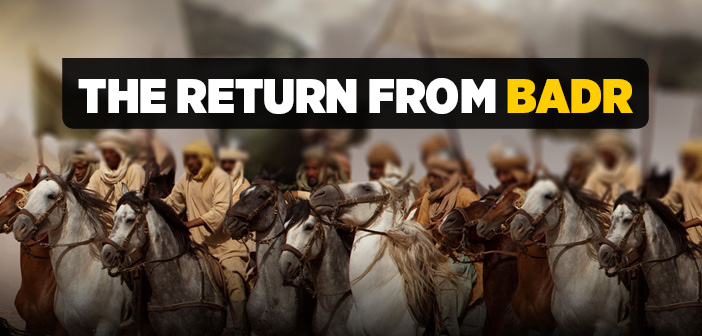What is donation in Islam? Who is donated to in Islam?
Prior to setting out on the Campaign, the Noble Messenger -upon him blessings and peace- rallied the Companions to donate to cover the many needs of the army. Medina, at the time, was under the grip of a severe famine. Regardless, setting aside all personal thoughts and motives amid a supreme effort of iman, the Companions keenly embarked upon a race of altruism. Abu Bakr -Allah be well-pleased with him- presented his entire wealth. When the Blessed Prophet -upon him blessings and peace- said, “I have not benefited from anyone’s wealth as much as I have benefited from Abu Bakr’s”, Abu Bakr -Allah be well-pleased with him-, already reduced to tears by then, said, “Are not my wealth and I for you alone, Messenger of Allah?” (Ibn Majah, Muqaddimah, 11). This was a confirmation that he had devoted his entire existence to the Blessed Prophet -upon him blessings and peace- and had become annihilated in him.
“What have you left for your wife and kids, Abu Bakr?” asked the Blessed Prophet -upon him blessings and peace- to which the Companion again replied, with ecstatic iman, “Allah and His Messenger!” (Tirmidhi, Manaqib, 16/3675)
Omar -Allah be well-pleased with him- had brought half his wealth, thinking at least this time he might surpass Abu Bakr -Allah be well-pleased with him- in donation. But he again fell short.
Othman -Allah be well-pleased with him- prepared three-hundred camels, fully equipped, and donated them to the army, together with a thousand dinars. Regarding him, the Blessed Prophet -upon him blessings and peace- stated the following words of loving compliment, “Nothing Othman will do shall harm him anymore!” (Tirmidhi, Manaqib, 18/3700; Ahmad, V, 63)
In addition, Othman -Allah be well-pleased with him- and his family donated the entire jewelry they had in the way of Allah, glory unto Him. Likewise, all the female Companions brought whatever they had of jewelry and ornaments and put them in front of the Noble Messenger -upon him blessings and peace-.[1] An eleven year old girl, unable to remove her earrings, ripped them out from her ears from sheer enthusiasm and placed the bloodied earrings in front of the Blessed Prophet –upon him blessings and peace-.
Even the underprivileged Companions, who barely had anything to donate, were caught up in the excitement of wanting to donate something. One of them was Abu Aqil -Allah be well-pleased with him-, who working all night, made two scales of dates, one of which he took home and the other which he donated to the Muslim army. The Blessed Prophet -upon him blessings and peace- said, “May Allah prosper what you have brought and what you have kept”, then ordered the dates be added to the rest of the pile of donations. (Tabari, Tafsir, X, 251)
The hypocrites, on the other hand, began mocking what they perceived as petty donations, charging Abu Aqil with insincerity. Uqbah ibn Amir -Allah be well-pleased with him- says the following:
“Once the ayah for charity[2] was revealed, we began carrying wood on our backs and donating from what we earned. Then came a man who gave away a great amount, about whom the hypocrites remarked, ‘He is showing off’. There came another, who gave a measure of dates, about whom the hypocrites again said, ‘Allah stands in no need of his single measure of dates.’ Thereupon it was revealed:
‘They who taunt those of the faithful who give their alms freely, and those who give to the extent of their earnings and scoff at them; Allah will pay them back their scoffing, and they shall have a painful chastisement.’ (at-Tawbah, 79)” (Bukhari, Zakat, 10; Muslim, Zakat, 72)
From what is understood from the alternative versions of the above narration, the man who donated a great amount was Abdurrahman ibn Awf -Allah be well-pleased with him-, while it was Abu Aqil -Allah be well-pleased with him- who brought the single measure of dates.
Ulbah ibn Zayd -Allah be well-pleased with him-, another from among the poorer Companions, woke up after a certain time into the night, offered salat and then prayed, “Allah…You command and encourage for jihad. Yet you have not given me power over a single mount on which I can set out in Your way with the Messenger of Allah! You have not even placed a mount in Your Messenger’s hands on which I can set out! I have always given the charity I have been obliged to give, from my wealth and body. Allah…And now I have only a single piece of item, which you have bestowed upon me, to give…and that I shall offer!”
In the morning, he came next to the Noble Prophet -upon him blessings and peace- and said, “I have nothing with me, Messenger of Allah, that I can give away as charity except for this single item! Let me say that I bear no grudge from now against those who might speak ill of me or mock me in regard!”
To these words laden with as much compassion as love, the Blessed Prophet -upon him blessings and peace- simply replied, “May Allah accept your charity!” and nothing else. The next day he told Ulbah, “I took your charity and glad tidings to you! By in Allah, in whose Hand of Might the life of Muhammad resides, you have been recorded in the book of those whose charities have been accepted!” (Ibn Hajar, al-Isabah, II, 500; Ibn Kathir, as-Sirah, IV, 9; Waqidi, III, 994)
Some hypocrites were still striving to influence Muslims, weak of iman, and hold them back from taking part in the Campaign. They had taken the house of a Jew by the name of Suhaylim as base. Upon becoming informed, the Prophet of Allah -upon him blessings and peace- sent Talha -Allah be well-pleased with him- and a few other Companions and had the house burnt down. The hypocrites were hence forced to disperse, their courage too shattered to engage in a similar mischief again.[3]
On the other side, Believers whose hearts were besieged by the fright of Divine wrath from the cautionary Revelations over their former slackness, had now joined the Campaign in all their entirety, to the extent of leaving Medina to look like ghost town with their departure. There was still the possibility that the Campaign would last longer than expected and any turmoil that may have broken out in the capital could have meant that the State would struggle to keep itself together. Similarly, huge losses in the battlefront could have meant the weakening of Islam in the short run. The perishing of knowledgeable persons, needed to form the driving force of intelligence behind Muslims, could have resulted in the collapse of the State, among other severe consequences. To prevent this right from the beginning, Allah, glory unto Him, declared a standard concerning participation in battle:
“Nor should the Believers all go forth together: if a contingent from every expedition remained behind, they could devote themselves to studies in religion, and admonish the people when they return to them,- that thus they (may learn) to guard themselves (against evil).” (at-Tawbah, 122)
Compliant with this command, the Blessed Prophet -upon him blessings and peace- left Ali and Maslamah -Allah be well-pleased with them- in Medina, to ensure the maintenance of security behind the front.
[1] Waqidi, III, 992.
[2] The relevant ayah is the 103rd of at-Tawbah, most of which was revealed with regard to the Campaign of Tabuk:
“Take alms out of their property, you would cleanse them and purify them thereby, and pray for them; surely your prayer is a relief to them; and Allah is Hearing, Knowing.”
[3] Ibn Hisham, IV, 171.
Source: Osman Nuri Topbaş, The Prophet Muhammed Mustafa the Elect II, Erkam Publications





